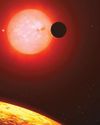कोशिश गोल्ड - मुक्त
An underwater mountain hosts creatures unknown to science
How It Works UK
|Issue 190
An underwater mountain chain off Rapa Nui, also known as Easter Island, hosts an astonishing array of deep-sea species, at least 50 of which are new to science.

About 800 to 1,200 metres below the southeastern Pacific waves, researchers on a Schmidt Ocean Institute expedition found the deepest photosynthesis dependent animal ever found, a Leptoseris, or wrinkle coral, which was already known to science. Other jaw-dropping sights included a jellyfish-like critter known as a flying spaghetti monster and a luminescent deep-sea dragonfish from the family Stomiidae. Both these creatures, along with more than 100 other species, have previously been described by scientists but had never been spotted in this region before. Another 50 specimens, which have yet to be analysed, are thought to be newfound species.
यह कहानी How It Works UK के Issue 190 संस्करण से ली गई है।
हजारों चुनिंदा प्रीमियम कहानियों और 10,000 से अधिक पत्रिकाओं और समाचार पत्रों तक पहुंचने के लिए मैगज़्टर गोल्ड की सदस्यता लें।
क्या आप पहले से ही ग्राहक हैं? साइन इन करें
How It Works UK से और कहानियाँ

How It Works UK
UNCANNY'S DANNY ROBINS
The creator and host of the BBC's Uncanny series tells us about his most chilling experiences while researching the show, and writing a ghost book for children
4 mins
Issue 208

How It Works UK
HOW FEATHERS GROW
A bird's proteinaceous plumage comes from the same source as our hair
1 mins
Issue 208

How It Works UK
New EV battery technology could power 500-mile road trips on a 12-minute charge
Scientists have used a neat chemistry trick to tackle a major challenge facing future batteries.
2 mins
Issue 208

How It Works UK
HOW AIR PURIFIERS WORK
These filtration devices clean a room's air of particles that can make a person sick
1 min
Issue 208

How It Works UK
Chinese scientists hunt for alien radio signals in a 'potentially habitable' star system
TRAPPIST-1 is a red dwarf star located about 40 light years away that hosts seven Earth-sized rocky planets, with at least three orbiting in the habitable zone where liquid water could exist.
2 mins
Issue 208

How It Works UK
WHAT HAPPENS WHEN WE DIE?
Our bodies are vessels for life, but in death they undergo a cascade of chemical and biological changes
3 mins
Issue 208

How It Works UK
WHY ARE KEYBOARDS QWERTY?
There's a reason why this seemingly random arrangement of letters is widely used on keyboard layouts
1 min
Issue 208

How It Works UK
A 'quasi-moon' discovered in Earth orbit may have been hiding for decades
A new paper describes a possible 'quasi-moon' of Earth, an interloping asteroid that may have been following our planet around for decades, undetected.
1 mins
Issue 208

How It Works UK
WHAT'S AN ANTI-DRONE GUN?
How these devices intercept and disable unmanned aerial vehicles
1 mins
Issue 208

How It Works UK
Dozens of mysterious blobs discovered inside Mars may be 'failed planets'
Giant impact structures, including the potential remains of ancient ‘protoplanets’, may be lurking deep beneath the surface of Mars.
2 mins
Issue 208
Listen
Translate
Change font size
